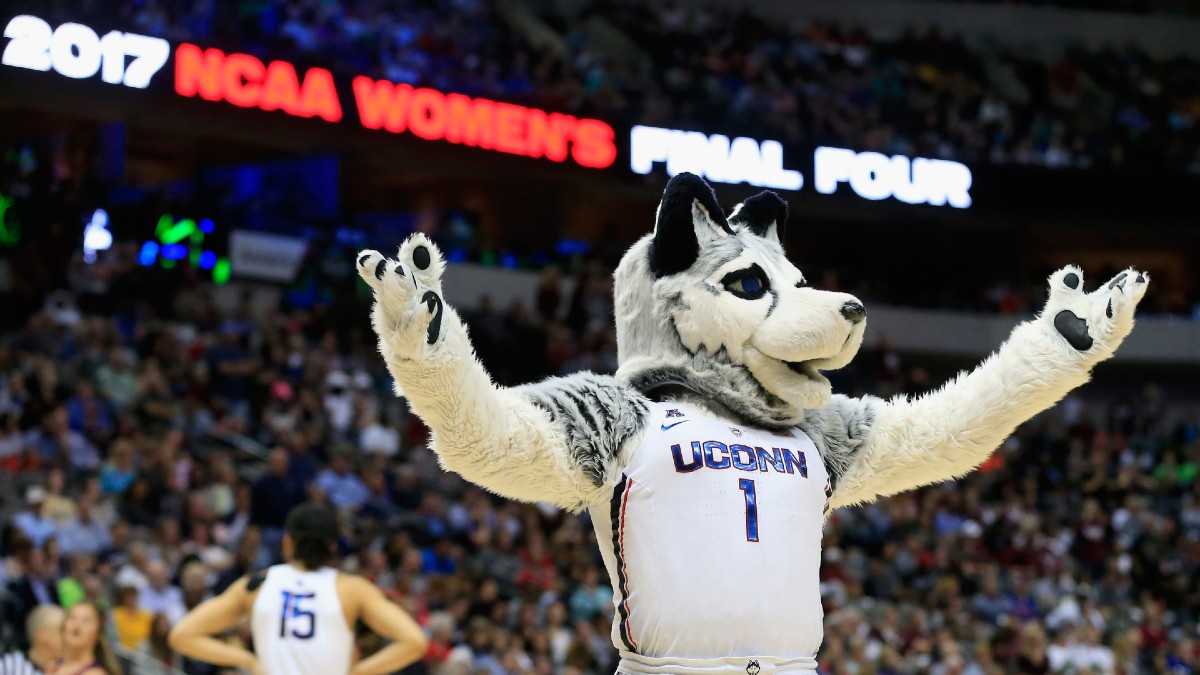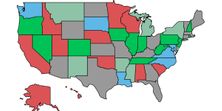Connecticut Gaming Compact Bill Could Jeopardize Daily Fantasy Operators
Ron Jenkins/Getty Images. Pictured: Jonathan the Husky, mascot for the Connecticut Huskies.
Daily fantasy operators may be prohibited from offering contests in Connecticut this fall after lawmakers amended a sweeping gaming bill Thursday.
The bill, the legislative component of a compact between the Connecticut government and the state’s two gaming tribes, would legalize online casino gaming, sports betting and also enact licensing regulation for DFS operators. However, updated language agreed to by a committee Thursday and approved by the whole House hours later would prohibit DFS operators from offering contests during the ensuing rules making and review process, which could last until 2022.
Top DFS companies such as DraftKings and FanDuel, which have offered contests in the state for years, could be unable to do so during the upcoming football season, perennially their most lucrative sport.
“Our organization and member companies are in favor of mobile sports betting in the state, but the proposed legislation is really disruptive for fantasy sports,” said Peter Schoenke, the president of RotoWire.com and former chair of the Fantasy and Sports Gaming Association, in an interview with The Action Network.
Connecticut Law Jeopardizes DFS
Gov. Ned Lamont and the Mohegan and Mashantucket Pequot tribes announced a groundbreaking compact deal earlier this year that would allow the tribes to open one online casino and sportsbook site, or “skin,” apiece. The deal also permitted the state lottery to launch an online sportsbook as well, and 15 brick-and-mortar sportsbooks can also open in the state.
DFS operators would be taxed 13.75 percent of gross gaming revenues, the same as more profitable sportsbooks and one of the highest fantasy contest rates in the country. But the fees, Schoenke said, are not as concerning as other regulations.
All DFS operators would be subject to both legislative and regulator approval. Schoenke said the industry largely supports regulation, but companies offering contests in Connecticut currently may have to suspend operations during the rulemaking and implementation process, which could last until 2022. That means no contests during the upcoming NFL season, far and away the most popular sport for DFS players.
The legislation also appears to limit DFS operators to a single tethered partnership with one of the tribes or the lottery, meaning there could be no more than three total DFS providers in the state. That shouldn’t be an issue for FanDuel or DraftKings, the latter of which is already partnered with the Mashantucket Pequots, but would effectively shut out nearly every other smaller provider.
“The worry for the industry is you’re looking at a limited environment with skins that’s not good for DFS,” Schoenke said. “We have a lot of small companies and startups that don’t fit that way.”
The enacting compact legislation still needs to be approved by both the full Senate, meaning there are opportunities to change the DFS provisions. But Connecticut’s 2021 legislative session ends next month, and stakeholders and policymakers are eager to get the major gaming compact passed through the legislature.
That leaves little time and political capital to prevent what would be arguably the nation’s most restrictive legalized DFS market.
Florida DFS Legislation
Connecticut’s move comes days after a similar industry-opposed DFS bill was rejected by Florida lawmakers.
Part of a larger legislative package surrounding its own gaming compact legislation, Florida lawmakers introduced a bill Monday that would have charged operators a $1 million licensing fee, far and away the highest rate in the country, and also prohibit players under age 21. Like Connecticut, Florida’s bill would have effectively forced operators to suspend contests during a regulatory review process this fall.
Lawmakers pulled the DFS legislation Tuesday after extensive industry pushback.
“We avoided catastrophe as an industry,” Schoenke said.
Schoenke said the industry would be happy to work on legislation at next year’s regular session, but lawmakers must focus on a legislative framework that had been successful in other jurisdictions. In the meantime, moves in both states underscore the ongoing legislative difficulties facing the DFS industry.
Roughly two-dozen states have formally legalized and regulated such contests and only a handful explicitly ban them. That leaves more than 20 additional states (including Florida and Connecticut) where operators exist in an undefined, legal grey area.
DFS advocates have argued for years their games are not gambling and therefore not subject to the same regulations as sportsbooks. Courts and legislatures in different states have interpreted DFS's legality with disparate results, helping to create the legal imbroglio that has sounded the industry since its inception nearly a decade ago.
Iowa and Arizona both approved DFS contests as part of their respective sports betting packages in recent years, a trend that has helped end the legal limbo in a growing number of jurisdictions. While most states have approved DFS on industry-favorable terms, new legislation considered this week reaffirms the ongoing political, logistical and legal obstacles these providers have faced since they burst into the national consciousness in 2014 and 2015.
A seemingly endless advertising barrage accompanied DFS's launch, helping spark legislative pushback that jeopardized the industry's existence five years ago.
“It was surprising that this year we had two states take this approach compared to the last few years,” Schoenke said. “There was a proven model with how to work with the industry and for two states to go back in time, it feels like we’re back in 2015 or 2016.”
How would you rate this article?



